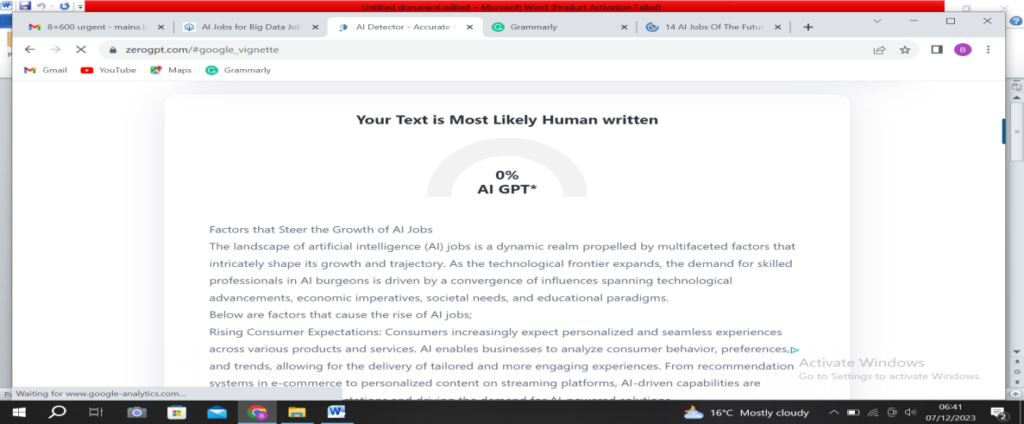The landscape of artificial intelligence (AI) jobs is a dynamic realm propelled by multifaceted factors that intricately shape its growth and trajectory. As the technological frontier expands, the demand for skilled professionals in AI burgeons is driven by a convergence of influences spanning technological advancements, economic imperatives, societal needs, and educational paradigms.

Below are factors that cause the rise of AI jobs;
Rising Consumer Expectations: Consumers increasingly expect personalized and seamless experiences across various products and services. AI enables businesses to analyze consumer behavior, preferences, and trends, allowing for the delivery of tailored and more engaging experiences. From recommendation systems in e-commerce to personalized content on streaming platforms, AI-driven capabilities are shaping consumer expectations and driving the demand for AI-powered solutions.
Industry Adoption: Almost every industry explores AI applications to enhance efficiency, productivity, and decision-making. Healthcare, finance, manufacturing, retail, and even entertainment sectors are integrating AI-driven solutions. This widespread adoption creates a surge in job opportunities, from data scientists and AI engineers to AI ethicists and AI product managers.
Technological Advancements: The rapid advancement of AI technologies has created a growing need for skilled professionals. As AI algorithms become more sophisticated, from machine learning to natural language processing and computer vision, companies seek experts to develop, implement, and optimize these technologies across various industries.
Data Explosion: The daily proliferation of data generates a fertile ground for AI applications. Companies seek professionals leveraging this data to train machine learning models, extract valuable insights, and create predictive analytics tools. AI jobs in data processing, analysis, and interpretation are in high demand.
Diverse Job Roles: AI jobs encompass a broad spectrum of roles. Data scientists, machine learning engineers, AI researchers, AI ethicists, software developers specializing in AI, and robotics engineers are just a few examples. Each role requires specific expertise, contributing to the diversity of AI-related job openings.
Automation and Efficiency Goals: Businesses aim to automate repetitive tasks and optimize processes through AI technologies. This drive for efficiency encourages companies to invest in AI talent to develop, implement, and maintain AI systems that streamline operations, leading to a surge in job opportunities.
Government Initiatives and Funding: Governments worldwide recognize AI’s importance in driving economic growth and competitiveness. Initiatives promoting AI research, development, and implementation often lead to increased job opportunities in this field.
Skills Gap and Educational Programs: The rapid evolution of AI has led to a shortage of skilled professionals. Educational institutions and online platforms have responded by offering specialized AI courses, certifications, and degree programs, aiming to bridge the skills gap and meet the rising demand for qualified AI talent.
Ethical and Regulatory Considerations: The ethical implications of AI deployment have prompted the need for professionals specializing in AI ethics, governance, and compliance. Organizations seek individuals who can navigate complex ethical challenges while developing AI solutions, creating another niche within the AI job market.
Increased Adoption Across Industries: AI’s potential applications span diverse sectors, including healthcare, finance, manufacturing, retail, and more. As businesses recognize the benefits of AI in enhancing efficiency, reducing costs, and driving innovation, the demand for professionals who can harness AI’s capabilities intensifies.
Cost Reductions: The decreasing costs of hardware, storage, and cloud computing have made AI more accessible to a wider range of organizations, from startups to large enterprises, fostering its adoption across industries.
Cultural and Societal Shifts: Changing attitudes towards technology and its integration into daily life have also contributed to the rise of AI. Acceptance and integration of AI-driven solutions in society, from virtual assistants to autonomous vehicles, indicate a shift towards embracing AI as a part of modern life.
Global Competitiveness: Countries worldwide are investing in AI to gain a competitive edge in technology and innovation. Governments are fostering AI ecosystems by supporting research, development, and initiatives, which in turn drive job creation in AI-related fields.
Key Takeaway
These factors collectively contribute to the rising demand for AI professionals across various domains. As AI continues to evolve and permeate industries, the need for skilled individuals adept in AI technologies, data analysis, ethical considerations, and innovation is expected to grow exponentially.
Author Bio
Alan Roody?is a professional Blogger. He regularly writes on his blog,?Widetopics, to keep all the readers updated with the latest facts on a wide range of topics.


